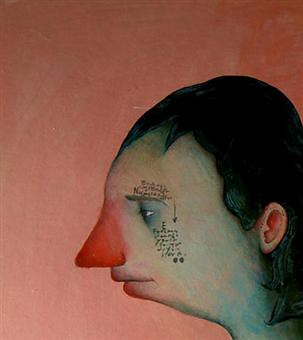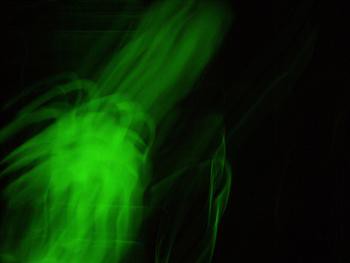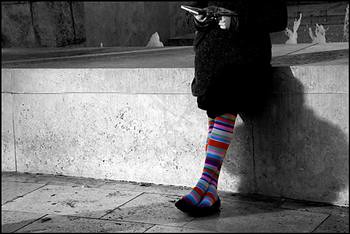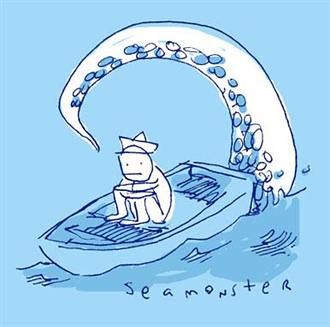Plan B and death
 Image: IncaHalf Staff Stomp - The Dying Californian
Image: IncaHalf Staff Stomp - The Dying Californian
The Dying Californian's 2003 album We Are the Birds That Stay leads off with this great, anthemic song called "Prairie Fire" -- a sloppy, huge-chorused track that should have been as "big" as Band of Horses' "The Funeral" and for similar reasons. It bypasses the original gut-punch of grief for the full-bloom ritual of mourning (to borrow from Joan Didion's Year of Magical Thinking: "Grief was passive. Grief happened. Mourning, the act of dealing with grief, required attention") and it howls and moans and tears its hair and rends its garments, before busting out with some cheesy keyboard effects. And works anyway on an entirely visceral level. Nothing on the band's new album Coarsegold (Amazon, eMusic) is as immediately arresting as that song, but Dying Californian is still mining misfortune for fat diamonds. In "Half Staff Stomp" singer Nate Dalton MCs a funeral picnic, commanding mourners (in doleful shades of Michael Stipe/Mark Eitzel/Jeff Tweedy) to "dry your eyes again." Even if the shoulder-swaying mid-tempo beat didn't motivate, the ridiculous cowbell would. And you can imagine these guests dropping their cold fried chicken and white plastic shovels of potato salad, abandoning their beer n' lemonade, finding their feet, and shaking off their sorrow.
The Dying Californian's Myspace.
The Secret Life of Dolls and Doldrums - We All Have Hooks For Hands
We All Have Hooks For Hands indeed have hooks. And red noses, grass-stained jeans, grape-gum purple tongues, scraped elbows, scuffed sneakers, balled Kleenex in pockets. They have bent monkey bars, crooked swings, sand spilling its box, games of tag that become games of tackle that become tearful brawls that are no game at all. Mostly, they have throats raw from shouting just to hear their own voices and the lung-sore, muscle-weary joy of child's play on a fine spring day.
More WAHHFH playground aesthetic can be found on their The Pretender (Amazon, eMusic). Their MySpace.
Also: Berkeley Place is asking for your list of the best independently released rock albums. Vote now before polls close.
Falling pressure, rising damp
 Image: mLeeEzra Moon - Autumn ShadeThe song opens a window for the moon and draws in the warm night damp. And everything goes soft: the piano sodden, the violin rusty, the singer rasping kittenish as moss grows -- strange and velvet -- on the soles of her feet.
Image: mLeeEzra Moon - Autumn ShadeThe song opens a window for the moon and draws in the warm night damp. And everything goes soft: the piano sodden, the violin rusty, the singer rasping kittenish as moss grows -- strange and velvet -- on the soles of her feet.
From Ezra Moon (Strange Attractors Audio House, eMusic). You can hear more of the record on Autumn Shade's (aka Jes Lenee's) Myspace.
Oh joy

Image: Gregory James WalshJoy - Silver Daggers
There's as much rage and despair -- those other hazardous spills that slop their neat plastic buckets all over the waxed floor of your tidy mental domicile -- as joy in this song. The singer's a riot grrl fronting the Contortions, all involuntary yelp and afflicted flail. It's like she's trying to bore her body through a thicket of biting green flies, but their sharp sting delivers a narcotic serum so blissful, she can't decide whether it's pain or pleasure, whether she really wants to flee or instead stand still, stretch out her arms, lift her chin, expose her naked neck and declare, "bite me, bugs! Go ahead, feast!" (I'd say both -- check the woo hoo! at 0:33 followed by a sounds-like-swipe from Psycho at 0:49.)
From New High & Ord (Load Records). Silver Daggers' Myspace.
What I did on my spring vacation

Image: Nicola Millesuoni
I'm back, bloody hell. Blogging's an addiction I tell you. Don't ever start if you can help it.
Dadaughter - Matzak
I was never a club kid and even now am, at best, a techno tourist. But I'm always pleased when I find such bright, melodic, occasionally flat-out gorgeous electronic music as Matzak's Life Beginnings (eMusic, iTunes). The microhouse album's gestation period roughly tracked French producer Nicolas Matuszczak's first daughter's own internment in the womb, and if this riddle in nine syllables is rather unimaginatively titled, at least it severs itself from the sentimental new-daddy template -- right from the get-go. Opener "La Muerte" (yes, death) is a looped obscenity-spattered vocal sample riding dubby reverb and a progressively dense cacophony of beats and pulses. Not that I would know, but I betcha its foggy-headed alarum echoes parent-to-be-panic nicely. In death we are in life, of course, and the record proceeds to body-moving exhilaration by track two; though builds to the rave-ups are gradual and tasteful (wouldn't want to wake the baby). I love, in particular, "French Pop," a giddy, pliant number with some trebly nursery-tune figures that begs for a remix that'll foreground its fantastic rhythms. But the collection's crown is its 9+ minute closer, "Dadaughter." It's a production that starts snowy baby-blanket white, with pristine blips and incandescent organ glow, then gently swells in perfectly paced stages, gradually gathering color and texture, including some brief buzzy-bleepy spazz-outs. It swells round and rich and ample. It swells human.
Matzak's Myspace.
Dulce et Decorum - Alsace Lorraine
Call For Papers (Ian Catt mix) - Alsace Lorraine
When he's not making buoyant, sophisticated synth-pop with friends and far-flung associates as Alsace Lorraine, Paul Francke is an Episcopal seminarian. This could explain the cloistered/worldly tension the work projects -- or it could mean nothing much at all. Unless you have Dark One's (buy pre-May 8 street date at Darla) liner notes handy and know that the record hopscotchs some pretty detailed images in the service of elliptical stories-of-a-kind, Alsace Lorraine's lyrics -- whether sung in Francke's dreamy tenor or in the little-girl lisp of Argentinian chanteuse Isol -- are mostly intriguing but incomprehensible tongue utterances.
Yet named after the historically contested patch of European earth (from which, incidentally, my own surname hails and, I'm betting, Francke's), Alsace Lorraine hints at some intellectual heft. And I suppose I should mention (though if you graduated high school in an English-speaking country, you probably already know) that the phrase "dulce et decorum," while original to the scribblings of ancient Rome's Horace, is better known as WWI poet Wilfred Owen's wrenching twist on that old lie about wartime glory. This song, however, doesn't have that kind of grand-scale conflict, but instead appropriates the phrase's connotative aspects for troubles of a more domestic nature (a woman leaving an abusive relationship, I think). No matter. What counts is the sound-sweep: its swooning soft glamor, its billowy beats and coy false ending, its adolescent ache. D&D is one of my favorite songs so far in 2007.
And Ian Catt's remix of "Call For Papers" (the original also appears on the album) is the most slink-slithery come-hitherish song ever to marshal academic stasis as metaphor for romantic frustration. And while I never thought I'd follow a sentence containing the words "academic stasis" with a declaration like this: It's crazy sexy.
Alsace Lorraine's Myspace.
Isol (Marisol Misenta) is also an illustrator. You can enjoy some of her charming pen n' inks here.
I had a dream last night

We Didn't Need To Breathe - Seamonster
Annalee - SeamonsterThere's something naggingly familiar about the way the man who calls himself Adrian Seamonster gravely strum-and-moans a dream journey from an oxygenless world into outer space in "We Didn't Need To Breathe." Or how he eee-eee-eees through his teeth over churning beds of electro-folk psychedelia in "Annalee." And that's because few young musicians make less effort to disguise a single source of musical inspiration. No, Seamonster is utterly forthright about his admiration, nay naked worship, of the Elephant Six Experience. In fact, on his Myspace he's streaming a wonderfully unpretentious little song that commemorates a dream he had about Robert Schneider and, er, an abacus. Betraying his obvious delight in the enchanting possibilities of low-tech recording devices, Seamonster's ring-ding-jangle-'n-tap bedchamber pop pieces give off some whiff of mellower, mid-90s Apples in Stereo tracks. Yet the real archetypes for Seamonster are Neutral Milk Hotel's early, hissy recordings -- those lonely campfire songs about engines and circles of friends and the disquieting tune-scraps that eventually reconfigured into In the Aeroplane Over the Sea.
I don't need to point out how charged with potential disaster a crush like Seamonster's is; plenty of terrible bands (and only a few good ones) are fired-up by Jeff Mangum's complicated genius. Seamonster circumnavigates this particular iceberg by focusing on the stuff that really made NMH so good in the first place. He has an easy yet forceful way with a tune. Instead of assuming the song will just sort of fall into place around the fetching sounds he coaxes from his toybox of instruments, he subordinates everything to an insistent (in the case of "Breathe," very insistent) melody. If this sounds dead obvious, I encourage you to wile away an hour hopping the Myspace pages of random singer-songwriting hopefuls (pretend you're an mp3 blogger!) and then get back to me. Also, Seamonster's music -- to the extent this is even possible -- telegraphs a certain unselfconsciousness. These songs sound private, built for their maker's own enjoyment or as modest gifts for friends, but certainly seem limited in their intended reach. (Not that they should remain that way.) They revel in their own fuzzy logic, referring to our world but with an intimate, dreamlike integrity of their own. Regardless of how much artifice (I mean, of course) contributes to the effect, it's warm and engaging and marvelously personal.
Seamonster has been touring pretty extensively and will begin recording a full-length album soon. You can buy his sweet homemade EP White Whale at his website for $5 (and should).
Little Birds - Neutral Milk Hotel
Song Against Sex (Live at Lounge Ax / Chicago, 4.25.98) - Neutral Milk Hotel
Before the internet seekers made unreleased NMH odds and sods easily accessible and downloadable, you had to hunt and peck for them. "Little Birds" was always a hard one to find and became, both by its relative scarcity and content, sort of a holy grail for Jeff Mangum acolytes. It's a crummy live recording; emergency sirens squall in the background for most of the last two minutes (something that isn't, it turns out, entirely inappropriate). But even unfinished, it's a sublime (both in the wonderful and terrifying senses) song and a crucial chapter in the book of Neutral Milk Hotel.
Little bird, little bird come into my body, Mangum enjoins in that wobbly steel-bowled voice -- so resonant, so uncanny, so uniquely his. It's his familiar preoccupation with innocence (in this case, both the boy and the birds, alternately orphaned) and frustrated attempts to shield or shelter it from harm. I just want to swallow up and promise to protect them, he keens, drawing out the consonants like he's slow-pulling a thin rope strung with broken birds from the pit of his own guts. It's a promise, I suppose, like Holden Caulfield's poignant watch in the rye fields, a longing, ineffectual vigilance, all heart and no sense. And it's shattering, this promise and its failure. It's shattering, this song. You cannot listen to it more than a couple times in one sitting without getting bruised by its hard volleys of surplussed feeling, or nicked by its sharp, cresting wave over wave of unease.
It's my way to pick at any scab, so I will. If Mangum's oeuvre broods on a central anxiety (and yes, I'd say it does) it's over the problem of bodies -- their fragility, their vulnerability to violence and violation and mortality. And the possibility of transcendence, through imagination, with dreams, and sometimes, through sex. Though sex is such a fraught act, less often the "King of Carrot Flowers" ecstatic fumble of twining fingers through notches in spines. More often, a kind of inevitable but catastrophic entrance into adult conflict and suffering. In "Birds" a brother finds a lover in town, another boy, and his father "nearly beats his little brains in." Sex, in songs like "Sailing Through" and (ahem) "Song Against Sex" is an emotional ambush that offers, at best, grim rapture but not a love worth living for. Though "Sex" skirts the issue with an offer to sleep in the gutter, "while you sleep here on the floor." A temporary solution, that with "a match that's mean and some gasoline" expires in flames soon enough.
Despite its indifferent sound quality, I'm posting a live version of "Sex" because I was at that Lounge Ax performance. I don't exaggerate: It was the best rock show I ever saw. Rapturous, and nothing grim about it. As you can hear for yourself.
Also:Speaking of the E6, Greg Kot and Jim Derogotis devoted the March 30 Sound Opinions show to the Big Three (Apples In Stereo, Neutral Milk Hotel, Olivia Tremor Control). The longish interview with Robert Schneider is fabulous and worth the (free) podcast download alone. AIS main man on early impetus: It's the kind of war where you want to convert everyone to your side ... a love war.
And Before the First Kiss recounts a rather funny, but I'm sure mortifying encounter with a precious deli clerk over a song on the store's soundsystem.
Daytrotter has a zippy little session with one of my favorite poppoppop discoveries of last year, The Kingdom.
Annnd, this blog is on break for a while. I wouldn't expect to see anything new here in the next seven to 10 days. So unless you just want to come around to bask in our vacant blue glow, add us to your fave RSS reader so you'll know when we're back. (I'll still be checking email.)
Again with the winter bands
 Image: Marc Quinn
Image: Marc Quinn
End of the War - Winter FlowersWinter Flowers are from Los Angeles, where it's no miracle for flowers to bloom in winter. Rain comes hard and gray the first months of the calendar year, days upon days upon weeks of it, undermining the soft hills until they're rivers of mud, until sometimes they slide into the ocean, taking arrogant constructions of wood and stone and brick with them. But flowers bloom throughout and the sun, when it returns, is glorious, and people tend to forget the rain and other things (including the occasional rumble of earth-nudge beneath their feet).
Like Ray Bradbury's story "All Summer In a Day," this song is apres le deluge, perched in anticipation -- at a point where the imagined meets the actual -- in the white morning by the quiet door. And when the door draws open, framing a garden suddenly sun-lit like a bright penny or a fire in the stove, words fail. For this brief time (an instrumental just over a minute, right in the middle of the song) it's a carnival of color, a jubilance of banjo, acoustic guitar and piano, bounding, tumbling, cartwheeling one over, under and through another. The piano especially is delirious, off its head, dancing so abandoned it abandons keyboard and plays thick gold air.
Winter Flowers' self-titled debut (Amazon, iTunes) was released last fall and probably didn't receive the full attention it deserves. The band's Myspace.
Also:
Charlie of Nerd Litter posted a lovely piece on one insomniac Monday and Leonard Cohen's New Skin for the Old Ceremony.
Stephen King has a right-on rant, "How to Bury a Book," in the April 6 Entertainment Weekly about the disservice many publishers do to literary novels: Critics, with their stubborn insistence that there's a difference between "literature" and "popular fiction," are part of the problem, but the publishers themselves, who have bought into this elitist twaddle, are also to blame.
A crack in the dome
A Ransom - Winterpills
I Bear Witness - Winterpills
I liked the Winterpills' album The Light Divides (Amazon, eMusic) immediately. I mean, sure, most of it is mixtape-for-mom material, very Innocence Mission in its earnest loveliness (or lovely earnestness?). But it would take an especially tiresome snob or committed ascetic to refuse the pleasure of Winterpills. The slow, more meditative songs are deep, heartfelt sighs woven with rousing choruses. When the record picks up its feet -- with "Broken Arm," "Shameful" and "A Ransom" -- it does so with suncatcher melodies that seem to refract onto wide green lawns and with generous details, like the xylophone in "A Ransom" that plinks out a tinkertoy tune in delicate counterpart to the guitar's crunchy power chords. And then there are the boy-girl harmonies, rarely done better.
Listening to the album a couple times without knowing a thing about the band, and noting the lyrics (which I rarely do with music unless I think I might write about it) I thought I knew something about this record -- beyond how it sounds. And was baffled when promo copy and press reviews I subsequently dug up failed to confirm my assumptions. The Light Divides is a landscape that's lousy with Christian iconography, both implied and overt. Words like "savior" and "baptism" and "angels" casually grace the lyrics and there's talk of the end of the world. In the middle of the record, a tense, unmistakably Low-like composition, "I Bear Witness," creaks and squeals its way in a crawling processional to a cathartic crescendo. And I don't know if my textual interpretation skills are just really rusty, but from the first time I heard "Broken Arm," with lines like I think I finally understand the way a broken arm can hate the hand, I took it to be an extended riff on the New Testament injunction to pluck out the offending eye. (And if I'm picking up on this -- I, who despite a smattering of Sunday school acquired most of my scant Good-Book-learnin' in art history lectures -- it must be fairly obtrusive.)
And yet nothing I've unearthed about Winterpills says anything about God or faith or being born again. So maybe I read it wrong. And if so, here's an interesting question: Why would a secular band assume the idiom, and even in some cases, cadence, of Christianity? Is it a instance of cultural osmosis (after all, there's a lot of this kind of talk circulating in the U.S. these days)? Or a more conscious choice -- adopting a lexicon that conveys moral authority, that says "we're really serious about this stuff"? And if I didn't read the record wrong, is this another case of a Christian band that would prefer not to name itself as such while indie rock fans meet the issue with ambivalence, even cognitive dissonance?








